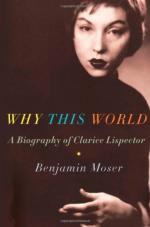|
This section contains 5,931 words (approx. 20 pages at 300 words per page) |

|
SOURCE: "Self Doubt in Clarice Lispector's Laços de família," in Luso-Brazilian Review, Vol. 14, No. 2, Winter, 1977, pp. 161-73.
In the following essay, Seniff questions the emphasis on philosophical and existential concerns asserted by early critics of Laços de família, analyzing instead the psychological "thematics" and "stylistics" of self-doubt—the "mortal perception of reality"—and noting the pattern of equilibrium-disequilibrium-equilibrium in seven stories.
Clarice Lispector's collection of short stories, Laços de Família, yields an intimate and subjective exposition of the psychological trauma that frequently accompanies mortal perception of reality: self-doubt. Criticism of the work during the last decade has, however, tended to avoid analysis of this predilect concern of many of the contos, preferring instead to emphasize considerations that are often more philosophical than literary. The designation of Clarice's characters as Existentialist/Unamunian "'víctimas agónicas'" by one critic1 is symptomatic of interpretations...
|
This section contains 5,931 words (approx. 20 pages at 300 words per page) |

|


